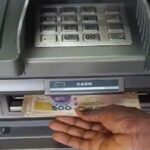Governor of the Central Bank of Nigeria (CBN) on Tuesday took his campaign for his naira redesign and cashless policy to the members of the diplomatic community who met at the Ministry of Foreign Affairs in Abuja.
Emefiele, who said he was glad to have been given the opportunity to explain the apex bank’s recent monetary policy decisions as well as the “prevailing global and domestic developments” that negatively affect the Nigerian economy, clarified the contextual realities that shaped the central bank’s decisions and its expectations for the future, despite the challenges.
Join our WhatsApp ChannelPutting the background of the naira debacle in context, Emefiele said that data at the Central Bank of Nigeria showed that, in 2015, currency in circulation was only N1.4 trillion. “As of October 2022, currency in circulation had risen to N3.23 trillion; out of which only N500 billion was within the Banking System and N2.7 trillion held in people’s homes.”
“These indicate that, so far, we have held excessive amounts of currencies in our hands rather than in banks or in cashless platforms. Ordinarily, when CBN releases currency into circulation, it is meant to be used and after effluxion of time, it returns to the CBN thereby keeping the volume of currency in circulation under the firm control of the CBN. It should also be noted that the Notes in private homes and outside the banking system are not available for economic activities and thus may affect the economy attaining its potential growth.”
Read the full text of Emefiele’s argument
“Our in-house analysis of the pre-policy currency adequacy indicated not only that currency outside banks was excessive but also that quantum of currency in circulation was suboptimal. Exhaustive simulation and model-based analysis founded on the drive to achieve a 20% – 40% cashless economy indicate that the optimal value of currency in circulation for the Nigerian economy is only N700 billion. This is just a fraction of the hitherto currency supplied to the economy and could explain, in part, the excess demand we have witnessed in foreign exchange market and to some extent goods market.
Expected Benefits of The Policy
Generally, currency redesign policies are designed by countries to strengthen the performance of key macroeconomic parameters and equally combat social improprieties. Chiefly, it is expected to reduce the amount of cash in underground or illicit economy, truncate the activities of racketeers, and obliterate rent-seeking businesses in the black market. By reducing currency outside banks, it will shrink money stock and accordingly lower the long-run path of inflation. The ensuing deflationary pressure could elicit interest rate cuts that will in the short- to medium-term boost economic activities, spur aggregate demand, and enhance output growth.
The macroeconomic impacts of currency redesign are multidimensional and could seem uncertain especially at this early stage when its inconvenience is widespread. By spurring more people to use bank accounts, this policy will further increase bank account ownership and increase the use of accounts by enhancing people’s saving behavior. It could encourage some hitherto informal business operators to formalize the pattern of transactions and adopt more formal settlement channels. As experiences from other jurisdictions have shown, effective currency redesign can support regulatory reform, increased legislative reach and coordinated fiscal and structural policies. Aside the general benefits of a currency redesign, we expect a number of economic gains for Nigeria, including:
Reduction in Money Supply:
Effectively implemented currency redesign causes a fall in money supply. This will lead to reduction of value of money in circulation and a deceleration of the velocity of money in the economy leading to less pressures on domestic prices. As we mop up cash in circulation, money supply could decline, under certain assumptions. In addition, the speed at which money changes hands could reduce. Basic economic tenets under the quantity theory of money suggests that the fall in monetary velocity could retard price growth and taper nominal money supply.
Lowering Inflation:
The policy is typically expected to cause deflation in the market as less cash holding reduces currency outside banks and retards money circulation. The accompanying decline in money supply will thus slow pace of inflation. As you can see, we have stated to witness inflation trending downwards, following general price stability in almost all genre of markets including for goods and financial products. For instance, analysis shows that an effective implementation of the policy could by itself scrape four percentage points off the current level of inflation, as it steadily slows inflation rate to about 18.0 percent by mid-2023.
READ ALSO: BREAKING: Call CBN On 07002255226 To Arrest POS Agents Selling Naira, Charging Above N200
This is quite achievable, as data from our market sources indicate that the prices of grains and key staples, around Suleja and Lambata markets for instance, have generally been on the downward trend since the beginning of the policy. The price for soya beans has dropped from N30,000 to N22,000. Maize from N18,000 to N16,000. The price of a bull fell from N400,000 to N330,000 and ram from N75,000 to N50,000.
Exchange Rate Stability:
Prior to the announcement of the policy, the huge cash haul outside the banking system had exerted significant pressures on the exchange rate at all windows, but more so at the parallel market as it engendered asset substitution by speculators, and rent-seekers. While the policy was initially estimated to lead to more speculations due to panic moves as most people try to understand the policy action, it is expected to reduce speculation in the medium- to long-run. Today, the limited circulation of the new Naira notes has forced the hands of speculators and we are beginning to witness some stability. The initial pressure is projected to further moderate as the implementation of the policy takes-off and a wider understanding pervades the system.
Reason for Queue and Pressure
Before concluding this brief, let me state, and sadly too, that we acknowledge the widespread inconveniences due to this policy. We have observed pervasive incidences of hoarding and predatory activities of some vendors and unscrupulous Nigerians. The principal causes of the hardship to the citizens following the redesign policy include:
Hoarding –
We have noticed that some members of the public are hoarding the new notes thereby restricting their flow through the economy. Cash kept at home will not circulate but may fuel a perception of scarcity which leads to higher demand for the currency, signalling to those who don’t have an urgent or immediate need to store cash.
Tension and Elevated Agitations –
There is tremendous tension and elevated agitation by our leaders who should be calming frayed nerves by the citizens. We believe that a large proportion of these agitations are staged and sponsored propagandas or an exaggeration of the reality. No doubt that there are pockets of pressures in some areas, the CBN is working hard to shift resources to those areas in order to ease the tension. The situation is substantially calming down since the commencement of the Over-the-Counter payments to compliment ATM disbursements and the use of super agents.
Panic Queues –
The CBN has also noticed long queues at some bank ATMs and banking halls. Whilst some of these withdrawal requests are genuine, some are simply the reprehensible activities of miscreants who do not have the genuine intention of making a withdrawal but are seeking quick-earnings by queuing up just to sell their spaces to make money.
Panic Mop-up of Notes by Politicians –
The CBN has also noticed that some politicians are buying the new notes and storing them for political purposes.
Incidences of Economic Opportunism –
We have also noticed that some Nigerians are capitalising on the transition to charge exorbitant fees or demand cash payment on the false pretext that PoSs don’t work, especially at petrol stations. These selfish actions for personal monetary gain are creating hardship for Nigerians and may come at the expense of fellow citizens lives and livelihood.
Concluding Remarks
The CBN reiterates the availability of an appropriate amount of currency (redesigned N200, N500, and N1,000 denominations and current N100, N50, N20, N10 and N5 denominations) to support economic activities. The Bank is collaborating with the entire financial ecosystem DMBs, OFIs, MMOs, Super Agents, MFBs Payment System Providers and EFCC, ICPC and other law enforcement to ensure that Nigerians have a variety of options for financial transactions either through electronic channels or in exceptional circumstances, cash.
We are mindful of the challenges some citizens have faced and are addressing them. There have been reports of occasional failures in e-channel platforms. Our monitoring suggests that whilst there has been an expected surge in electronic transactions, these have not risen to unprecedented levels and the payment system is well equipped to handle even higher transaction volumes. Whilst transaction failures are bound to occasionally occur, the public is encouraged to have full confidence in Nigeria’s globally recognized payment system infrastructure. Banks have also been instructed to ensure 24/7 service availability and promptly address any customer refunds arising from such service failures.
The CBN remains committed to ensuring a seamless, inclusive and equitable implementation of this exercise for the overall benefit of the people, financial system and Nigerian economy as a whole.”



















Follow Us